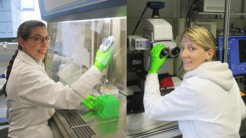Biomaterials from Potsdam for Charité dentists
From Research directly into Application
Two fundamental researchers from the Department of Biomaterials are involved in the interdisciplinary research project ‘InterDent’. It aims at making dental fillings and tooth restorations more durable in the future. The German Research Foundation (DFG) is funding this project with 2.1 million euros, initially for three years.

‘Together with dental colleagues from Charité, we will study how mineralized biofilms interact with artificial filling materials. Ultimately, this fundamental knowledge will help designing such materials to prevent the deposition of dental calculus or tartar’ says materials scientist Dr. Cécile Bidan, group leader in the Department of Biomaterials at the Max Planck Institute of Colloids and Interfaces (MPICI). With Dr. Laura Zorzetto, a biomedical engineer at MPICI, she is investigating the formation, the growth and the mineralization of biofilms, which are naturally formed during bacterial colonization of tooth surfaces and fillings.
It is a special feature of the research project ‘InterDent’ that fundamental researchers and dental clinicians are working together to develop new materials based on fundamental principles, in order to quickly create materials that are more suitable for practical use. In this context, the benefits are definitely reciprocal. ‘This project not only enables the translation of results from basic research into practice, but also, conversely, the inspiration of basic research by clinical issues,’ says Prof. Peter Fratzl, Director of the Department of Biomaterials at MPICI.
The scientists and dentists use tools from materials engineering with approaches from dental research to improve existing dental restoration materials. In dental caries filling materials made of polymer-based composites, metal alloys and various ceramics for instance are used but the durability varies greatly. In this context, learning from the interactions between strongly adherent calculus and restored tooth surfaces is essential.
‘InterDent’ names a research collaboration between the Max Planck Institute of Colloids and Interfaces, the Dental Clinic of Charité – Universitätsmedizin Berlin, the Technical University of Berlin and the Helmholtz Center Berlin. In total, the research project consists of four interdisciplinary subprojects, coordinated by Dr. Paul Zaslansky (Charité) and Dr. Claudia Fleck (TU). Dr. Bidan is leading the described subproject in association with Prof. Sebastian Paris, Scientific Director of the Institute of Dental, Oral and Maxillofacial Medicine of the Charité.












